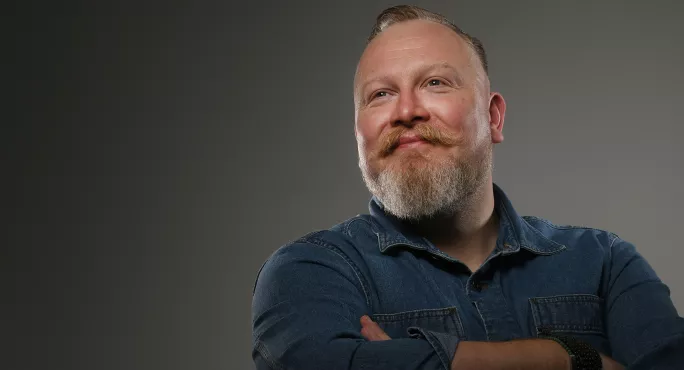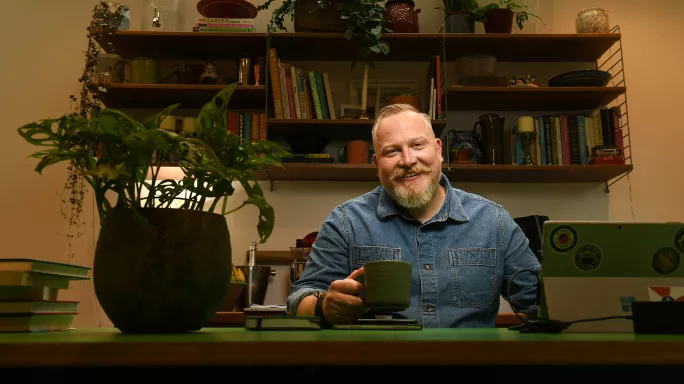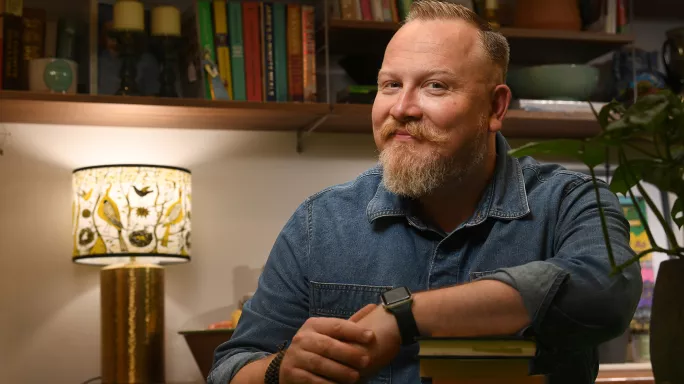10 questions with... Gareth Conyard

Gareth Conyard is co-chief executive officer of the Teacher Development Trust and a former civil servant who worked on many projects in the Department for Education, including the early career framework (ECF) reforms and the Nutbrown review of early education.
As part of our 10 questions series, Mr Conyard spoke to Tes about how he accidentally got into education and why he doesn’t like the narrative of “hero teachers”.
1. Who was your most memorable teacher and why?
Mr Walker, who was my history teacher when I was in secondary school. He was just a no-nonsense teacher, but he was really good at explaining things, and I did history at university because of him.
He was particularly good at laying out the connections between the facts of what was happening and the politics underpinning it.
I sent him a letter when he retired, just saying that he was my favourite teacher. I got a response from him. Then, randomly, there’s an old boys’ association from my school, and they had a thing at London Bridge and he was the special guest. So me and a friend went along and I was able to have a chat with him.
2. What was the best and worst thing about your time at school?
There were some really good things about school. I went to a grammar school, I didn’t come from a particularly well-to-do background and I went there when I was 13 years old. The expectation was that I would leave school at 16 and work with my dad, who had a cleaning business. And that just wasn’t an option at school - it wasn’t what people did. That expectation that I would go to university came from school and nowhere else. There was no one in my family who had been to university before then.
In terms of the worst, I still look back in horror at some of the things that were OK when I was a kid. So, in particular, some of the language that we would use around LGBTQ, for example. I went to an all boys’ grammar school. You would hear slurs and insults all the time. I’m delighted it doesn’t happen in the same way now.
3. Why do you work in education?
Honestly, it’s a complete accident. What I wanted to do was be a civil servant. When I was a teenager, I thought, “I want to do something that has an impact on the way things are done. I want to be at the centre of decision making”. But being a politician didn’t feel very enjoyable to me.
More Tes’ 10 questions...
- Caroline Derbyshire, chair of the Headteachers’ Roundtable
- Rachel de Souza, the children’s commissioner
- Helen Williams, the CEO of INMAT academy trust
I tried, while I was at university, for the [civil service] fast stream and kept on failing. And eventually I applied for a few different departments. They offered me a job at what was then the Department for Education and Skills. And that was back in 2003. It could have been a different department and maybe my life would look very different. But that’s where I’ve spent my career, and I’m really glad I have. I have thoroughly enjoyed it.
4. What are you proudest of in your career? And what do you regret?
One of the things about being a civil servant is that you are anonymous and you’re not supposed to be the person who takes the limelight. But there are definitely things I have been involved with that I think tick that box of having made a difference.
Fifteen years ago, maybe even longer ago than that, we started the work to raise the education leaving age to 18 years old, and that’s definitely something that has had a substantive impact.
I mentioned early years and I worked really closely with Cathy Nutbrown on the Nutbrown review. Although not all of that was necessarily taken up by the department, I think it really did make the case for investing in the quality of professionals in the early years. On a side note, I’m kind of pleased that I managed to sneak pictures of my kids on to the front cover.
And I think I would say the ECF. The ECF has issues, but it’s the biggest reform to teacher development since the early 1980s. So I’m pleased to have been involved in that.

In terms of regrets. I have obsessive-compulsive disorder (OCD), so a lot of my mental space is spent managing that. And a lot of that does involve going over all kinds of things all the time and saying, “Should I have done something differently?”
5. What would you say are the best and worst aspects of our school system today?
I think teaching is a really difficult job. I think teachers end up doing all kinds of stuff that they may not think is part of the job description when they first join, [and] maybe it shouldn’t be part of the job description.
So, the fact that you’ve got that dedication is just so astonishing. I think it really is impressive.
The worst thing is that I think there is something fundamentally broken about a system that has to rely on people to operate in that way. I don’t like the narrative of “hero teachers”...we shouldn’t expect them to be heroes.
I’m a trustee for Education Support, which is an amazing charity. It is really sobering just to work with that group of people and understand the pressures that teachers are under. I just think we ask too much.
6. Your own teachers aside, who in education has influenced you the most?
A big part of my career has been as a civil servant, and the first one I think who is so impressive in that space is someone called Elin Jones. She’s just so clever. She’s really good at thinking through the implications of delivery. Occasionally you meet these people who are operating on a slightly different level. I definitely tried at times to copy her in all kinds of ways. And I was lucky enough to work for her.
And Nansi Ellis. I’m writing a book with her at the moment on better education policy making. At the point when we met, I was leading the department team engaging with unions and she was the assistant general secretary at the Association of Teachers and Lecturers (ATL). There were just so many occasions when we were able to sit down and say, “What’s the way that we can unpick it? What’s the way forward with this stuff?” I really came to respect Nansi’s judgement and experience and her approach, which is why I’m now working with her to write this book.
7. If you became education secretary tomorrow, what would be the first thing you would do?
I would resist the urge to do anything straight away. I think there are so many things I could look at and say are problematic. But this is not a sector that has lacked change and initiatives over the past few years. And I think stability is its own reward in some ways.

I think what I would want to focus more on is having the right kind of processes to make sure that change is effective and meaningful in those areas.
8. What will our schools be like in 30 years’ time?
I have no idea. Artificial Intelligence is obviously the thing that people are talking about right now. And it may be transformative.
One of the things I think that strikes me about how people think about the future is that if you watch an episode of Star Trek, they will have spaceships with, you know, funky doors, all kinds of stuff. When it comes to anything that shows education, it is invariably a load of kids sitting at a desk with lots of lights and holograms and a teacher at the front. So even when you’ve got people writing science fiction, they haven’t been able to conceive of a new paradigm for teaching. So I think there’s the strongest chance that it’s just some version of where we are now, but with whatever technology involved.
9. Who has made the biggest difference to education in the past 12 months?
I think it’s hard to see beyond [the former joint general secretaries of the NEU teaching union] Kevin [Courtney] and Mary [Bousted]. I don’t think that the teacher pay deal would have been agreed without the way they charted that path.
I think they were really articulate. I think they did a really good job of presenting the case in a way that maybe hasn’t drawn the same sort of battle lines that some of the health professions have. So I think the fact that they pushed for something and then they managed to get it and then they resolved it. I think it’s pretty impressive.
10. What are the most important lessons you’ve learned over your career?
I think the thing I’ve learned most is it’s always about the people. No matter what you’re trying to do, or no matter what you’re trying to achieve, we are all people and we are working on our own lives in our own ways as best we can. I think whenever I have worked in a team, I’ve always appreciated being seen.
You need a Tes subscription to read this article
Subscribe now to read this article and get other subscriber-only content:
- Unlimited access to all Tes magazine content
- Exclusive subscriber-only stories
- Award-winning email newsletters
Already a subscriber? Log in
You need a subscription to read this article
Subscribe now to read this article and get other subscriber-only content, including:
- Unlimited access to all Tes magazine content
- Exclusive subscriber-only stories
- Award-winning email newsletters



